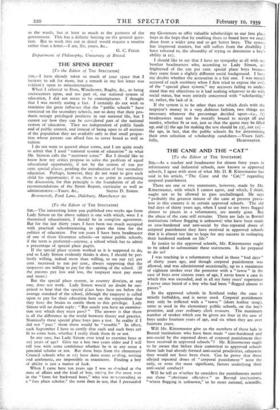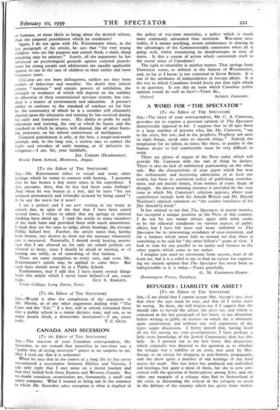THE CANE AND THE "CAT"
[To the Editor of THE SPECTATOR]
Snl,—As a teacher and headmaster for almost forty years in reformatory and industrial schools, now known as approved schools, I agree with most of what Mr. D. B. Kittermaster has said in his article, "The Cane and the ' Cat,' " regarding corporal punishment.
There are one or two statements, however, made by Mr. Kittermaster, with which I cannot agree, and which, I think, ought not to be allowed to pass unchallenged. He says "probably the greatest misuse of the cane at present preva- lent in this country is in certain approved schools. The old bad days of thirty years ago, when I used to see boys flogged almost to pieces in a reformatory, are mostly gone. But the abuse of the cane still remains. There are lads in Borstal institutions (where flogging is unknown) who have been made so case-hardened and anti-social by thee repeated doses of corporal punishment they have received in approved schools that it is almost too late to hope for any success in reshaping their hardened outlook on life."
In justice to the approved schools, Mr. Kittermaster ought to be asked to substantiate these statements. Is he prepared to do so?
I was teaching in a reformatory school in those "bad days" of thirty years ago, and though corporal punishment was allowed, and was administered occasionally, up to a maximum of eighteen strokes over the posterior with a " tawse " in the case of boys over sixteen years of age, I never knew a case in which this was exceeded, and in all my forty years' experience I never once heard of a boy who had been "flogged almost to pieces."
In the approved schools in Scotland today the cane is strictly forbidden, and is never used. Corporal punishment may only be inflicted with a " tawse " (short leather strap), same as used in the elementary public schools, on the boy's posterior, and over ordinary cloth trousers. The maximum number of strokes which can be given are four in the case of boys under fourteen years of age, and six when they are over fourteen years.
Will Mr. Kittermaster give us the numbers of these lads in Borstal institutions who have been made "case-hardened and anti-social by the repeated doses of corporal punishment they have received in approved schools "? Mr. Kittermaster ought to be aware that Wore their committal to approved schools those lads had already formed anti-social proclivities, otherwise they would not have been there. Can he prove that those alleged repeated doses of "corporal punishment" were the only, or even the most significant, factors underlying their anti-social conduct?
Will he tell us whether he considers the punishments meted out those "obstinate offenders" in Borstal institutions, "where flogging is unknown," to be more rational, scientific. or humane, or more lately to bring about the desired reform, than the corporal punishment Which he condemns?
Again, I do not agree with Mr. Kittermaster when, in the last paragraph of his article, he says that "for very young children who are like puppies and cannot think, a short, sharp smacking may be salutary." Surely, all the arguments he has advanced on psychological grounds against corporal punish- ment for young. people and adolescents are equally applicable against its use in the case of children in their earlier and most formative years.
Chridren are not born delinquents, neither are they born models of behaviour and morality. No doubt they inherit certain " instincts " and certain powers of inhibition, the strength or weakness of which will depend on the stability or otherwise of their constitutional nervous system; but con- duct is a matter of environment and education. A person's ability to conform to the standard of conduct set for him by the community of which he is a member will ultimately depend upon the education and training he has received during his early and formative years. His ability to profit by such education and training, the rate at which he learns and the standard to which he attains, will depend, like all other learn- ing processes, on his inborn endowment of intelligence.
Corporal punishment is only, at the best, a rough-and-ready attempt, and, in the long run, a useless one, to correct the faults and mistakes of early training, or of defective in- telligence.—! am, Sir, your faithfully,















































 Previous page
Previous page